With news of a live-action Ghost in the Shell remake starring Scarlett Johansen swirling around, it seems like a fitting time to revisit this stunning classic. Okay, I admit it: I’ve not seen much anime. Hardly any, in fact. Apart from the odd brush with Studio Ghibli, it’s a world that has largely passed me by. There’s no rhyme or reason as to why it doesn’t represent a significant portion of my DVD collection; I love animation, and having spent some time in Tokyo, I’m no stranger to Japanese culture. So, it would seem that there’s no excuse beyond my own laziness and a tendency to rewatch the same old stuff. For shame.
In an effort to remedy this gaping cultural hole, it seemed logical to settle down with something that would blow my mind wide open and fill it with fizzy wonderfulness, and thus bring balance to my skewed anime experience. Ghost in the Shell seemed like the perfect choice. A critical and commercial smash when it was originally released in 1995, Ghost in the Shell planted a flag for sophisticated adult-oriented animation in the popular consciousness.
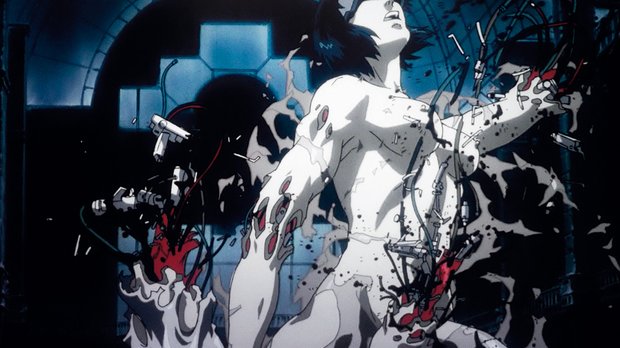
Unfortunately, I spent 1995 listening to Oasis on repeat, thus missing most of the significant events of the year – including the release of Mamoru Oshii’s revered slice of SF. And so, a mere 17 years later, the time had arrived to tick Ghost in the Shell off my internal list of “Films you really should have seen by now, no really, why haven’t you seen these yet?”. To the entertainment module I went…
Curtains closed. Lights down. Disc in… I was off, and immediately thrust into some form of politically motivated assault taking place in a pulsing digital future. Tantalising hints of unfamiliarity pricked my curiosity as a female operative communicated telepathically with some off-screen voice, her crowded brain drawing complaints from her handler. Within minutes, there had been a police raid, an assassination (resulting in a gloriously gory exploding head), and a suddenly naked lady operative disappearing in a haze of high-tech camouflage. All before the opening credits had even rolled. Nice.
The credit sequence itself was a thing of cold beauty, all green grids and cascading numbers as a female cyborg was birthed before my eyes. Those emerald digits felt instantly familiar, and I struggled to place where I’d seen something similar – until my malfunctioning brain box got itself into gear, that is. I’d read that The Matrix had been influenced by Ghost in the Shell, but wasn’t expecting such an obvious lift so soon into the film. Being of the male persuasion, I also couldn’t help but notice that not even 10 minutes into the film, there’d been a lot of lady-flesh on display, albeit robotic lady-flesh, and that it didn’t feel gratuitous, but rather naturally proportioned and real, a reflection of a real woman’s body remade with computerised accuracy. I made a note to investigate the significance of the female body in Oshii’s work (mainly by writing “boobs” on a notepad), and ploughed on.
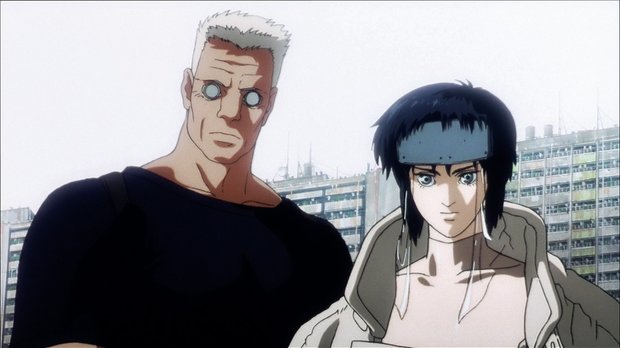
When the plot kicks in and the chase for the villainous Puppet Master begins in earnest, it became easy to appreciate why Ghost in the Shell made the impact it did. Talk of cyber-terrorism and über-hackers waging war across invisible oceans of information is no longer the stuff of science fiction, but rather everyday reality in a world that has been transformed by the internet. In 1995, this terrifying technological future was just beginning to come into being for most of the developed world, and in 2012, Ghost in the Shell feels, at least in some respects, alarmingly prescient.
Of course, we’re yet to engage in wholesale memory manipulation of the sort the Puppet Master uses against the unknowing trash men, but who knows where we’ll be in the coming decades? I was particularly struck by the heartbreaking consequences of the invasive hacking the Puppet Master engaged in, and the human cost to a man that wholly believed he was a married father and not a lonely singleton. That the working man could so easily become the victim of uncaring digi-criminals seemed to me an alarming glimpse at not only the present, where people’s online personalities and information can be stolen and manipulated, but a future where things could be taken even further. Damn you interweb and your all-conquering invasion into our lives! Pausing to shake a fist at the sky, I returned to the job in hand.
Get sneak previews, exclusive competitions and details of special events each month!
"Heads and ribcages were reduced to pulpy mash and fragile cyborg bodies were torn apart with sickening ease."
I found the mind-linking to the ’net, that characterises the everyday existence of the folks that inhabit the film’s near-future, endlessly fascinating. Augmented reality is a phrase that’s bandied about with increasing frequency these days, and as the Major chases the clueless trash men, the emerald 3D maps and easy flow of data she has access to hint towards a future that might yet be for all of us.
Of course, all this highfalutin talk of digital terrors is all well and good, but a whole movie of it could prove a little draining (and, frankly, scary). Thankfully, Ghost in the Shell more than delivered in the action department, giving my frazzled man-brain a break with some good old-fashioned runnin’ and shootin’. Peppered throughout the film, the action sequences were both exciting and unnervingly visceral. Heads and ribcages were reduced to pulpy mash and fragile cyborg bodies were torn apart with sickening ease. There was nothing gung-ho about the violence though. Like some terrible, ugly ballet, it helped emphasise the similarities between humans and machines.
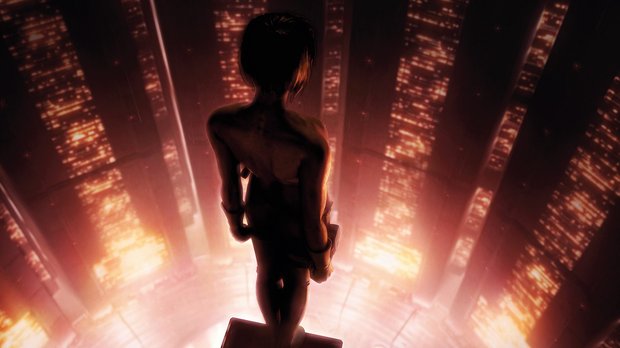
The characters themselves also push the viewer into thinking about the contrast between humans and cyborgs. Take Major Kusanagi; on visual inspection, she’s human (bar the ports at the back of her neck), but her body is entirely robotic. Her “ghost” – which as far as I can ascertain is a kind of digital soul – has human characteristics, but she remains unsure whether she has any humanity left or was, in fact, ever human at all. She’s a beguiling character that demands your attention. What, in the end, makes her human or not? She has feelings, inner thoughts, fears and even hobbies; she has memories and independent motivations; although her body needs a regular MOT to keep going, she’s essentially a free-thinking individual. So what, in the end, defines her as human or not? She’s a wonderfully compelling protagonist, combining existential angst with a futuristic invisibility cloak and kick-ass moves. What more could the discerning SF fan ask for?
The well-handled action and complex characters also maintain the adult tone of the film. Eschewing glamour and flash-bang emptiness for a serious-minded assault on the senses, you’re never in any doubt that Ghost in the Shell is for grown-ups. After all, there’s nothing more adult than the grisly consequences of a bullet through the head. In the minds of many, animation and childhood go hand-in-hand, but there’s never any doubt that Ghost in the Shell is addressing sophisticated themes. It demands to be taken seriously. The setting is a gritty, fully-realised urban environment, the language direct and occasionally fruity. If I’d watched this in 1995, I’d have felt very naughty indeed. My mother would never have allowed it.
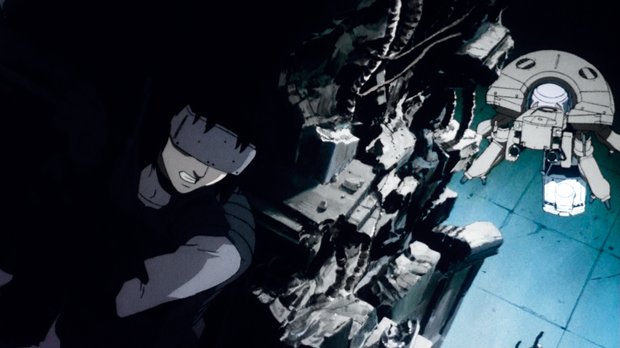
Still, if she had, I might have ended up an animator rather than a writer, because Ghost in the Shell is hands down the most beautiful animated film I’ve ever seen. The wonders of the internet tell me it used hand-drawn and digital techniques, enhanced in 2008, but I couldn’t sense the join and was gobsmacked by the results.
Hazy neon cityscapes, reflective surfaces throbbing and shimmering with light, hallucinatory underwater ballet and beautific visions of a messy urban sprawl had me spellbound. Mesmerised. Eye-drunk. The gaudy advertising hoardings, thick rain through smog, retina-scorching shop fronts – I was repeatedly blown away by the craftsmanship, the inventiveness, the sheer beauty of it all.
"If someone has been mostly or even entirely replaced by machine parts, can they still be classed as human?"
It probably helped that I’d been lulled into a semi-hypnotic state by the pulsing soundtrack. At turns ghostly and immediate, synthetic and organic, the music worked as an extension of the stunning visuals. The devil is in the detail, and that’s the secret to truly great films: every aspect is pored over with an equal amount of care and attention, lifting the whole to something greater than the sum of its parts. Ghost in yhe Shell is a prime example of that theory in practice, the soundtrack melding seamlessly with the visuals to create a thrillingly seductive and immersive sensual experience.
If Oshii had walked into the room at this point, I’d have likely given him the sort of hug I usually reserve for long-lost relatives, (and, if she’s good, my girlfriend). Ghost in yhe Shell isn’t just a well-told story. It’s a masterclass in plotting, direct emotional engagement and heart-stopping aesthetics. Philosophical musings sit happily alongside gunfights; it’s driven by a narrative urgency but there’s a striking sense of space as the camera lingers over a strikingly framed shot or a rainy surface. It’s a dense, complex film that still allows itself time to breath, and it achieves all this without even reaching 90 minutes.
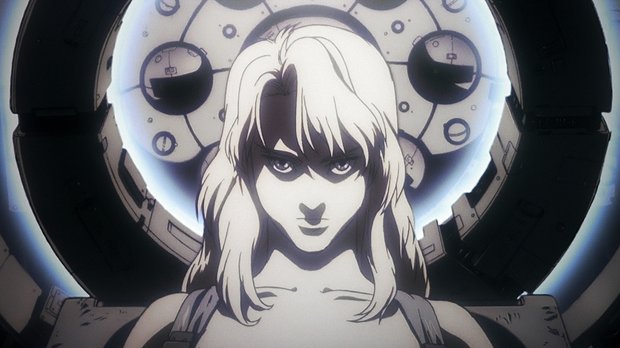
As if all that wasn’t enough, it’s intellectually curious and damned entertaining, a rare combination if ever there was one. I was most impressed with Ghost in yhe Shell’s attempts to address some of the biggest questions there are: what makes a human? How do you define consciousness? If someone has been mostly or even entirely replaced by machine parts, can they still be classed as human? Where does the line between artificial intelligence and independent life blur?
You can’t replicate consciousness in a lab, so how can humans claim to have any sort of ownership over something that they don’t entirely understand? Major Kusanagi’s philosophical stance is an endlessly intriguing one, throwing up the sorts of questions that we should all ask ourselves, especially as technology continues its unstoppable march.
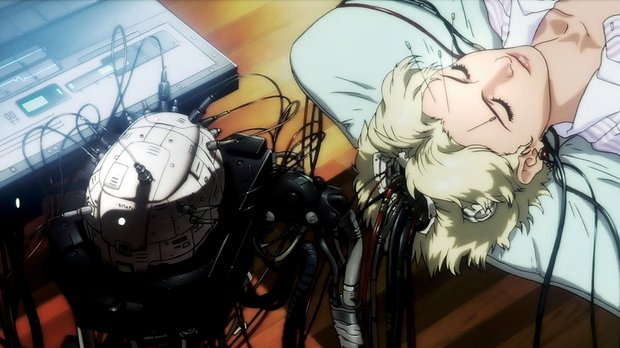
You could argue that this is all nothing more than armchair philosophy, but surely we could all do with some considered thought in our lives? After all, we live in a time when braying simpletons who revel in their own ignorance make millions, and celebrity is lauded above achievement. We need fiction like this, or we’re all in danger of being condemned to a lifetime of hellish celebrity bullshit. Search your feelings, you know it to be true.
By the end of the film, I was left completely convinced of Ghost in the Shell’s brilliance; a bold, ambitious film addressing big themes, a brave and stunningly executed examination on the nature of humanity, it really is something I ought to have seen a long time ago. It bears all the hallmarks of a truly great work of science fiction: a fully rounded future world; sympathetic and complex characters searching for a deeper understanding of their lives; beautiful locations and technologies; and, perhaps most importantly, an uncanny ability to prompt the viewer into considering the world around them from a fresh perspective. More of this sort of thing for me, I think…
Click here for more excellent SFX articles. Or maybe you want to take advantage of some great offers on magazine subscriptions? You can find them here.


